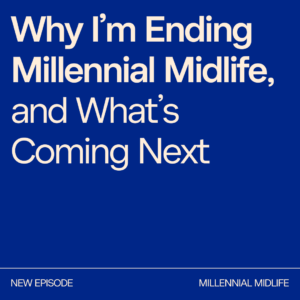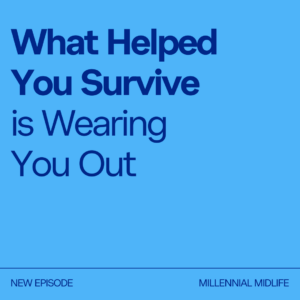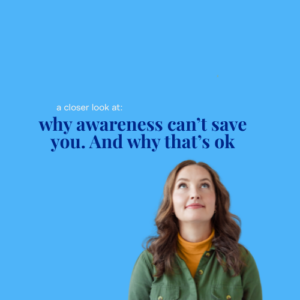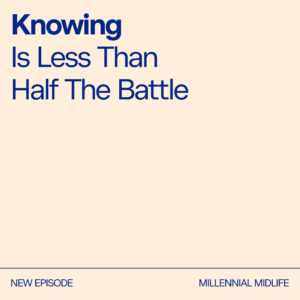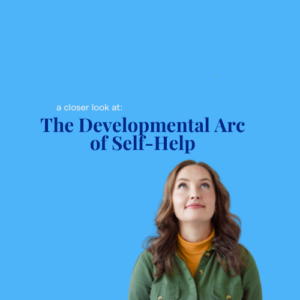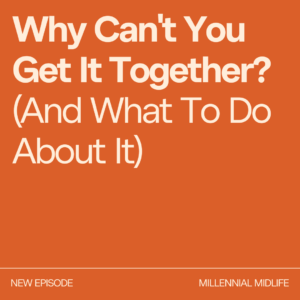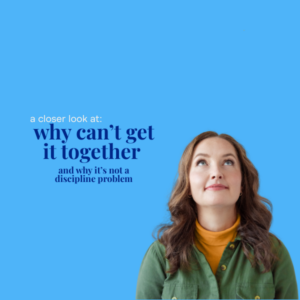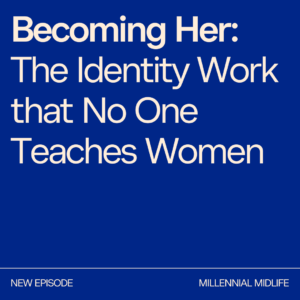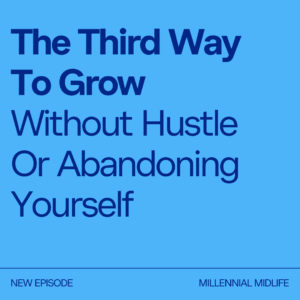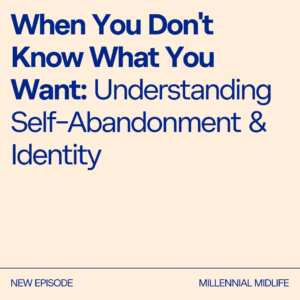Cecelia Baum Mandryk
I don’t know about you, but it surprised me when I realized that I was technically in midlife. I had been vaguely aware of the passing of time. Of course, I’ve had birthdays, whatever.
But it really hit me one day when I actually checked a different box on one of those forms, and I can’t even remember what form it was, but I remember this feeling that, I’m here. I’m in the middle part of life. Maybe you’ve had a moment like that too, and maybe it was a birthday or a comment or just that quiet realization that yes, now I am in midlife. Now I am in the thick of it. Culturally, we’re told or we’re often told that midlife equals crisis, right? And we picture sports cars, we picture dramatic
career changes, maybe doing something to like wild to recapture youth, like taking up skydiving. And honestly, as I’m even saying this, and as I was thinking about this episode, oftentimes we picture men going through this kind of crisis, right? And I think that the midlife crisis that women typically experience is a little bit quieter. It’s a little bit different, but I think we still have it, or it can be common. I do think that that’s not the whole story, those dramatic career changes, the sports car.
trying to recapture who we were at one point in the past. In her book, Barbara Bradley Haggerty talks about research on what’s called the U, the U shape of happiness. And across many studies, like these longitudinal long studies, people actually report higher happiness in their 20s and 30s, and then higher happiness again later in life. And the dip, the U, the bottom part, is actually life in the middle. It’s the 40s and 50s.
Sometimes that’s a little younger for people, a little older, kind of it skews a little bit, but we have this dip that shows up over and over again. And there can be a slump, but I don’t think there has to be a crisis. And actually, I don’t even know if there needs to be a slump. So what if instead we, collectively, reimagine this season as a time to get to know ourselves and actually dive into the life that we want to live? What if this was the juiciest, most fulfilling parts of our life, not this kind of let down part of our life?
Cecelia Baum Mandryk (02:58.394)
What if that U wasn’t actually a valley at all? Maybe it was actually a little hill, right? Or at the very least a much smaller dip so that midlife becomes a high point of our life.
When I say midlife, and I just said this a minute ago, I also want to open it up a little bit more because oftentimes we think of midlife as like 40 through 60. Sometimes people might say 30 through 50. But for some people, this sense of dissonance or crisis shows up a lot earlier. For me, it was in my late 20s. Sometimes it’s late 20s or even mid 20s. Sometimes it’s even perhaps in your teens into your 30s. And for other people, they don’t have this kind of this step or this realization about themselves until they’re in their 50s and their 60s.
So I think it’s very, it’s much more accurate to think of it as a middle of life adjustment. And this is a moment when perhaps we can pause and take stock and again, really engage with ourselves so that we are showing up how we want to. Okay, so the question or any question is where does the crisis part come in, right? I think the crisis comes in for people when we resist change. oftentimes people say that the crisis is life isn’t what they expected it to be.
And so our expectations for life or who we might be don’t expect don’t match the life that we have in front of us and When we notice that dissonance we actually get a choice and a lot of times we fight that gap we don’t want it to be there we think it shouldn’t be there and So we go into this sort of crisis mode instead of getting curious about it
I think this crisis also happens when we don’t actually, we feel like we don’t know ourselves anymore, right? Maybe we’ve spent decades of our life by this point, living by shoulds, we talked about that in the last episode, doing what we were supposed to do, right? Because it promised success, it promised happiness, it promised acceptance within our families, for many of us, it did lead to external success, but it didn’t actually, it led us further away from ourselves.
Cecelia Baum Mandryk (05:05.648)
So the matchup between external success and internal happiness or internal knowing isn’t always there. And we might feel like it’s too late, like, uh-oh, if I don’t know myself by now, it’s not gonna happen. And again, that’s when I think the scrambling to regain youth comes from. If you layer on top of all these different things, the massive identity shifts of this stage.
We’re taking on leadership roles. Maybe we’re changing careers or stepping into our careers in different ways. Maybe we’re becoming parents or our parenting is shifting. Maybe we’re caring for aging parents or we’re dealing with everything that is happening in the world around us. And midlife feels very ripe for the big questions. Who am I? Why am I here? What do I want now? Who am I in this world? The good news is, is I don’t think, as I mentioned, and you might have guessed, I don’t think midlife needs to be a crisis, right? It doesn’t need to be a lot crisis decisions.
where you feel like you’re scrambling to hold on or you’re trying to reclaim yourself in some way. It could be about pausing to understand the programming and the patterns that brought you here and then asking, is there another way I can relate to myself? In group coaching today, actually, we were kind of talking about this moment, this moment of crisis or dissonance that can happen in everyday life where something happens outside of us and we get kind of triggered.
And in that moment, when something happens within us, we actually get the chance to ignore it, to numb from it, to run away from it because it feels uncomfortable, or to lean in and actually ask questions to get to know ourselves in this moment. So what has been going on? What is bringing me to this? What is the thing that feels uncomfortable for me? And while we can do that moment to moment, I think we can also do that in this bigger part of our life, like in the middle part of our life. In general, we can say, am going to use this time and perhaps this
discomfort to change how I relate to me. Hagridi, Barbara Bradley Hagridi, you probably, if you listen to NPR, you recognize her name, right? But in this book that she has on midlife, she emphasizes that people who spend this stage of life with a purpose who really invest their time intentionally, even with their responsibilities, and not only invest their time intentionally, but recognize the choice they
Cecelia Baum Mandryk (07:26.29)
have and what they’re doing come through happier, healthier, and more resilient. The opposite of resistant. So instead of avoiding the distance and numbing from it with overworking or late night scrolling or emotional eating, we lean into it. And we can let this dissonance and this discomfort be the signal that it’s time to reconnect with ourselves. One of the things that I think is really interesting about this connection point is
when we recognize that something is uncomfortable and we’re willing to stick with it for long enough to get to know ourselves, we actually come through it more empowered, more grounded in ourselves, more confident. So around spending your time intentionally, that might look like understanding the external expectations or requirements of your life and asking, which ones do I want to intentionally choose?
and so that the ones that you are actually engaging with, you’re doing so from this place of empowerment rather than this place of resentment. So leaning into emotional discomfort can sound really terrible. If this isn’t something that you’re used to doing and it’s not a practice that you have in your life, and also you might not know how to do it, right? Most of us were not taught how to feel emotions. We were taught how to avoid emotions and our thinking of
leaning into these maybe like despondents that we have about life or this resentment that we have around all of our expectations or all of the requirements and obligations that are life responsibilities. We might even not know where to get started. So it sounds overwhelming, but also perhaps painful and frustrating. But if you can figure out how to do that, and this is that is another skill that you can learn on the other side of that discomfort is actually a richer relationship with your yourself and a richer experience of life. I’m currently struggling with a
beginning of school, fall shifting weather, congestion thing. it turns out it’s translating to the words that I say as well. You’re getting the real version here. Okay, so for me, I’m 41 now. I just turned 41. We’re in September 2025 right now. As I’m recording this, my middle of the life adjustment, or least the first version of this came at the end of my 20s.
Cecelia Baum Mandryk (09:44.76)
I found myself asking those big questions, right? Is this really what I want to be doing with my life? I was working as a geologist at that point. Why am I here? know, why would I really want to spend this lifetime doing is really what I was asking. And opening it up, what would this look like? What could life look like instead if I didn’t just keep following this path, but I started to engage with this inquiry, even if it feels uncomfortable? And I’ll be totally honest, I took the numbing route for a while.
I drink a little, I shopped a little, I took some nice vacations, I ignored a lot, because it was uncomfortable to ask those things, right? It was uncomfortable for me to ask, why am I here? Or what would life look like if I did something different? Because looking at those questions meant that I had to look at those shoulds that we talked about in the last episode, right? It meant that I had to look at the expectations, the rules that I had been following, which had garnered me love and support and success and see
if I really wanted to keep buying into those. Eventually, I started listening to the questions instead of avoiding them. And I’d like to say there was some dramatic event, but it really was just instead of pushing them away one day, I asked them to myself and also to my colleagues, you know, what would you do if you didn’t work here or what would life look like? And as I engaged with them, even though they felt uncomfortable, they started to lead me down a path of getting to know myself, right? They became the very thing that I thought was going to
and rip my life apart, which it did to some degree, actually became the questions that helped me get to know myself more. So if you’re playing long at home, here’s a place to start. If you feel exhausted by your obligations or overwhelmed by your responsibilities, you might pause and ask, why exactly do I feel exhausted? What are my stories that I’m telling around these obligations and responsibilities? Do I actually want these? Where do I have choice in the matter?
And when you start to ask these kinds of questions or start to even ask, what am I feeling around this particular thing or this person or this responsibility? Why am I in this job or why am I chasing this next role? When you ask the questions and answer them instead of just avoid them, that’s where we get to move from crisis to connection.
Cecelia Baum Mandryk (12:02.566)
And this is what I do with clients in coaching. It’s powerful to have somebody else help you reflect because your brain is so good at avoiding these things. But you start on your own, right? Write these questions down, actually engage with them. This is this place where it’s really easy to intellectualize as well. You can listen to this episode and not do anything different. But a more powerful thing is to listen to this episode and then go for a walk and think to yourself or write the questions down in a journal and answer them.
speak out loud to yourself and get them out on paper. So you might ask yourself those questions that I said are around you know why exactly do I feel exhausted? What is the story I’m telling myself around this obligation? But when you’re engaging with somebody or something rather than somebody you might ask why is this important? What’s really in here? So as you land on answers
to these questions as you start to investigate, go a little bit deeper with those other questions that I just, that why is this important? What’s really in here for me? So midlife becomes a crisis when we ignore these questions and we start stepping away from ourselves even more. But it can become a high point when we engage with the questions and we get to know ourselves more. It can become a high point when we use this time as a time to work with ourselves.
This might mean working with a coach or therapist. It might mean writing pages like in Artist’s Way or another practice that helps you connect with yourself, but intentionally saying, if I feel disconnected, if I feel on the point of crisis or burnout, I’m going to re-engage with myself and I’m going to see why are we going in this way. Because honestly, it’s never about what’s happening outside of you. It’s what’s happening within you in response to what’s happening outside of you, which is not a way to gaslight yourself or positive-poly your way to happiness. It’s actually a way
of curious self-inquiry. When you ignore the questions, they don’t go away. They build into the crisis, right? Or they leave you more and more disconnected from yourself, which is what leads to regret and resentment at the end of life. And I think most of us, most of us, I would say, if we had the choice, would not want to be there. So instead of going into crisis, perhaps you could have a crisis free. You could have a connection filled. Let’s look at the positive, right? Instead of crisis free, let’s go for a connection filled midlife.
Cecelia Baum Mandryk (14:14.108)
that is possible for you. And you might even ask yourself if that was possible for me, what I want it and what would I do to get there? Would I be willing to devote time and resources, even just 15 minutes at the beginning of my day to write the pages, know, morning pages, if you’re familiar with artist way, you’re writing long handwriting, three pages to get to know yourself. Would I be willing to do that kind of thing? Because not everything is going to go smoothly because you don’t actually, but because when you don’t choose the discomfort,
and see it as an invitation, you actually will step into that crisis place. The discomfort, the questions are actually an invitation to stop resisting, to notice what’s no longer working in your life or what stories are no longer serving you, what nervous system states are no longer working, and start to explore who you really are in this middle part of life, getting to know yourself right now again, or perhaps for what might feel like the first time in this life. Instead of buying the convertible, maybe the real move
is buying back your own attention, your own time, and your own joy. So if you want to take this work further, first answer the questions in this episode, right? Engage with them there. And then if you’d like to do this work with me, you can either join me in the Life Lab, which is a group coaching container, or reach out to me to have a one-on-one consultation, or find somebody else, a therapist, a coach, some other way to engage with this work so that you can move from crisis to connection. And then you might think about yourself.
and your middle part of life and ask what would it look like if I were moving into connection. Thanks so much for being here and I will see you next time.




